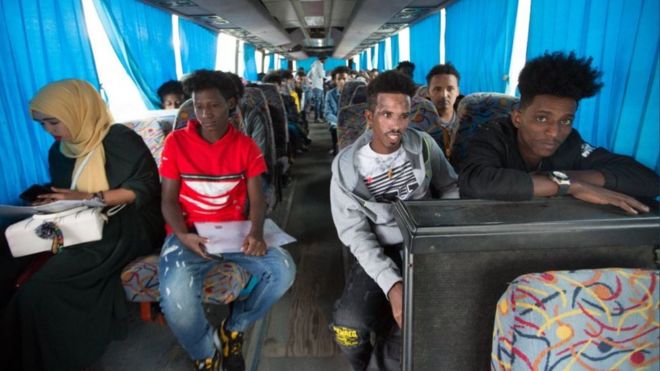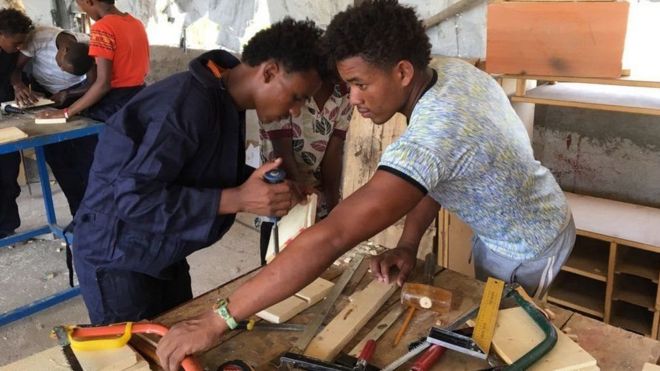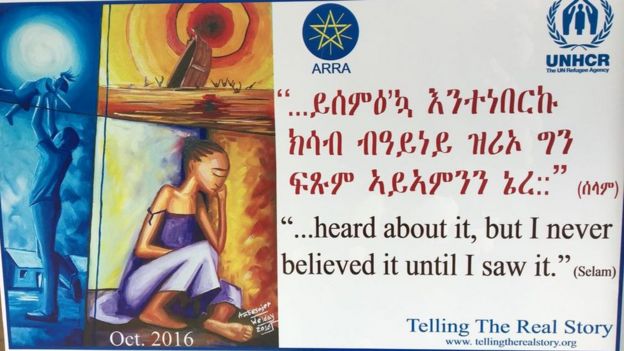 Exhibition on Eritrea opened by Thangam Debonnaire MP
Exhibition on Eritrea opened by Thangam Debonnaire MP
The evening was cold and rainy, but inside the University of Bristol Geography department there was an excellent turnout for a series of most informative presentations from Eritrean experts.
Thangam Debbonair, who is standing to be a member of parliament on 12 December, kindly left her campaign to take the time to open the event.
 Exhibition on Eritrea opened by Thangam Debonnaire MP. Thangam, Helen Kidane and Yodit Estifanos Afewerki
Exhibition on Eritrea opened by Thangam Debonnaire MP. Thangam, Helen Kidane and Yodit Estifanos Afewerki
She explained how vital it was for the British Parliament to continue to scrutinise how the Eritrean government behaved, its links with the international community and attempt to halt its human rights abuses.
Habte Hagos, who chair’s Eritrea Focus, explained to the Bristol audience the organisation’s increasingly successful campaign to counter the Eritrean regime’s activities.
 Exhibition on Eritrea opened by Thangam Debonnaire MP. Habte addressing with Dr Sarah Ogbay and Yodit Estifanos Afewerki (far left)
Exhibition on Eritrea opened by Thangam Debonnaire MP. Habte addressing with Dr Sarah Ogbay and Yodit Estifanos Afewerki (far left)
There then followed expert presentations from Helen Kidane (who had organised the event) Dr Sarah Ogbay (who described the terrible journeys Eritreans made to escape from the country of their birth) and Yodit Afewerki (who drew on her work with Eritreans in Italy to explain the complexities of acclimatising to a new country).
There was a lively question and answer session, with well informed interventions and questions from the audience.
 Exhibition on Eritrea opened by Thangam Debonnaire MP. Mohammed (from Keberi Trust) speaks from the audience
Exhibition on Eritrea opened by Thangam Debonnaire MP. Mohammed (from Keberi Trust) speaks from the audience
Thangam Debbonaire
Former MP for Bristol West, Chair of the All-Party Parliamentary Group on Refugees and Co-Chair on the All Party Parliamentary Group on Eritrea.
Petros Tesfagherghis explained his role during the liberation struggle.
 Exhibition on Eritrea opened by Thangam Debonnaire MP. Thangam with Petros
Exhibition on Eritrea opened by Thangam Debonnaire MP. Thangam with Petros
Helen Kidan
Co-founder of the ‘Horn Human Rights’ and ‘Eritrean Youth’ in the UK; Executive member of the ‘Eritrean Movement for Democracy and Human Rights’; member of the ‘Network of Eritrean Women’ and ‘Eritrea Focus’.
 Exhibition on Eritrea opened by Thangam Debonnaire MP. Helen Kidane (left) and Yodit Estifanos Afewerki
Exhibition on Eritrea opened by Thangam Debonnaire MP. Helen Kidane (left) and Yodit Estifanos Afewerki
Yodit Estifanos Afewerki
Works with migrants, asylum seekers, and refugees. Currently employed by the French NGO, Médicines du Monde within a European project previously in Calabria and now in Rome, where she manages a project on access to healthcare for migrants in informal settlements.
 Exhibition on Eritrea opened by Thangam Debonnaire MP. left to right: Yodit Afwerki, Dr Sarah Ogbay
Exhibition on Eritrea opened by Thangam Debonnaire MP. left to right: Yodit Afwerki, Dr Sarah Ogbay
Dr Sarah Ogbay
Member of the EFND, LIA-BAAL (languages in Africa, British Association of Applied Linguistics) and the Network of Eritrean Women, Eritrean Snit Study Group.
 Exhibition on Eritrea opened by Thangam Debonnaire MP. left to right: Yodit Afwerki, Dr Sarah Ogbay and Habte Hagos
Exhibition on Eritrea opened by Thangam Debonnaire MP. left to right: Yodit Afwerki, Dr Sarah Ogbay and Habte Hagos  Exhibition on Eritrea opened by Thangam Debonnaire MP
Exhibition on Eritrea opened by Thangam Debonnaire MP
__________________________________________________
EXHIBITION
 Exhibition on Eritrea opened by Thangam Debonnaire MP
Exhibition on Eritrea opened by Thangam Debonnaire MP
‘Eritrea in the News’ is a photographic exhibition revealing a series of fascinating images captured at pivotal points in the country’s history, from Italian colonial rule through to the struggle for independence and the repression of dictatorship that followed. The photographs feature a mix of archive material and personal collections. The exhibition shows the trajectory of the country in a visual snapshot of the places and people that have shaped Eritrea, stretching as far back as 1882 up to the present day.Today, after decades of repression, there is a glimmer of hope. Ethiopia has reached out to Eritrea. Their leaders have met and there is the prospect of reconciliation. Yet Eritreans still long for true freedom.
About Eritrea Focus Eritrea Focus is an association of Non-Governmental Organisations(NGOs), human rights organisations, exile and refugee groups and individuals concerned with the gross abuses of human rights in Eritrea. It is an open and inclusive organisation that welcomes members from all sections of the Eritrean communities both at home and in diaspora as well non-Eritreans that are concerned with the dictatorship and the complete absence of rule of law in the country. It is funded through voluntary donation from members.










 Chairman of Sudan’s Sovereign Council Abdel-Fattah Al-Burhan (L, front) receives Eritrean President Isaias Afwerki (R) at the Khartoum Airport in Khartoum, Sudan, on Sept. 14, 2019. Eritrean President Isaias Afwerki on Saturday arrived in Khartoum for an official two-day visit to Sudan, a statement by Sudan’s Sovereign Council said. (Xinhua/Mohamed Khidir)
Chairman of Sudan’s Sovereign Council Abdel-Fattah Al-Burhan (L, front) receives Eritrean President Isaias Afwerki (R) at the Khartoum Airport in Khartoum, Sudan, on Sept. 14, 2019. Eritrean President Isaias Afwerki on Saturday arrived in Khartoum for an official two-day visit to Sudan, a statement by Sudan’s Sovereign Council said. (Xinhua/Mohamed Khidir)






















